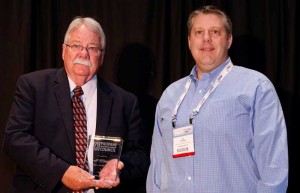PERC recognizes fleets with autogas awards

Travis Snellings, left, general manager of Van Go Transportation, poses with Ed Hoffman, president of Blossman Services. Photo courtesy of Alliance AutoGas
Six transit fleets received the 2016 award for Top User of Propane Autogas from the Propane Education & Research Council (PERC).
According to PERC, the award celebrates fleets creating healthier environments for riders and cities with clean, cost-effective and domestically produced autogas.
“We’re excited to recognize so many fleets for converting to propane autogas,” says Michael Taylor, director of autogas business development for PERC. “Propane autogas offers many advantages to public and private transit, such as reliable performance, cleaner operation with fewer emissions and decreased maintenance, a low total cost of ownership and exemption from idling restrictions.”
Recipients of this year’s awards are Alamance County Transportation Authority in Burlington, North Carolina; the city of Austin, Texas; the Fayetteville Area System of Transit in Fayetteville, North Carolina; the Suburban Mobility Authority for Regional Transportation (SMART) in Detroit; the San Diego Metropolitan Transit System in San Diego; and Van Go Transportation in Richmond, Virginia.
According to PERC, Alamance County – an Icom North America partner – has operated dual-fuel vehicles since October 2015. It has converted 16 of its 27 transit vehicles, and plans to convert the remainder of the fleet over the next three years.
The city of Austin currently runs nine autogas buses and began using propane in 1999. The city hopes to run half of its fleet on autogas and half on compressed natural gas as part of the city’s initiative for a cleaner environment, PERC says.
Another Icom partner, Fayetteville Area System of Transit began using autogas for its fleet in May 2016 and is on track to exceed $50,000 in savings annually, according to PERC. The city has converted three buses of 29 in its fixed-route fleet, and 12 of 18 in its paratransit fleet, with plans to convert all paratransit buses to autogas.
Detroit’s SMART first considered autogas after experiencing high fuel costs for its diesel and gasoline fleets in 2014, and it began using 74 autogas buses in October 2015, PERC says. The fleet hopes to expand to operating 117 of its 341 buses on autogas.
The San Diego Metropolitan Transit System converted 36 percent of its mini buses and paratransit buses to autogas this fall, with plans to convert the entire fleet of 215 buses within five years. According to PERC, the fleet hopes to reduce greenhouse gas emissions by more than 2,580 tons per year when all buses are converted and save more than $700,000 in the first year of operation.
Van Go, an Alliance AutoGas partner, began using autogas in 2012, PERC says. The fleet is currently running 49 of its 60 vehicles on autogas, with an additional five buses coming online with the alternative fuel this year.
“At first, it was an ethical and environmental question based on my desire to have a green company, back in 2012,” says Van Go Transportation’s Sid del Cardayre, regarding the company’s autogas conversion. “With cleaner fuel for our vehicles, not only was it better for our environment, but engines were going to break down a lot less often. Also, cleaner-burning propane autogas provides less maintenance and a tremendous emissions reduction, which exceeds all expectations.”
















